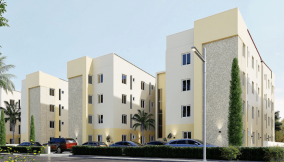Real estate and construction demonstrated uncommon resilience, sidestepping the challenges in the economy and contributing N11.2 trillion to the Nigerian economy in the first quarter (Q1) of 2024.
According to close watchers, this contribution is surprising given that the sector was hit hard by a combination of factors including galloping inflation, volatile exchange rate, high interest rate and astronomical rise in the cost of inputs, especially cement and iron rod.
“Real estate and construction are the most resilient sector of the economy and we all saw the result of this resilience in the first quarter figures released by the National Bureau of Statistics (NBS), which shows that the sector contributed N11.2 trillion to the economy in this period,” Funsho Adebayo, a real estate consultant, told BusinessDay in an interview.
Adebayo’s explanation re-echoes the submission of Risdikatu Ahmed, MD/CEO, Aso Savings and Loans, mortgage bankers, who in her opening remarks on Day 3 of the ongoing Africa International Housing Show in Abuja, described real estate as the most dependable and rewarding investment asset class.
Ahmed, who canvassed more space for women participation in the sector for greater contribution to the economy, urged the government to come up with more initiatives and programmes that will encourage investments in the sector, saying that the sector could contribute more to the gross domestic product if the environment is right and more enabling.
The latest NBS figures show that the N11.2 trillion, which the sector contributed in Q1 2024, is an improvement on the N9.1 trillion which it contributed in the fourth (Q4) quarter of 2023.
According to the report, in specific terms, while the real estate sector contributed 5.20 percent to the GDP in the period under review, the construction sector contributed 4.0 per cent of the GDP in the same period.
It added that, in nominal terms, real estate services within this period grew by 126.71 percent, higher by 124.34 percent than the growth rate it recorded in the corresponding period in 2023 and also higher compared to the fourth quarter of 2023.
“Real GDP growth recorded in the sector for the first quarter of 2024 stood at 0.84 per cent, lower than the growth recorded in the first quarter of 2023 by 0.86 percent points, and lower by 0.50 per cent points relative to Q4 2023.
“On a quarter-on-quarter, the sector grew by -27.88 percent in the first quarter of 2024. It contributed 5.20 per cent to real GDP in Q1 2024, lower than the 5.31 percent it recorded in the corresponding quarter of 2023,” the NBS report said.
Read also: How professionals can navigate economic uncertainties in real estate sector
The report noted, however, that whereas the construction sector grew by -0.29 percent in nominal terms (year-on-year) in the 2024 first quarter, there was a decrease of 38.00 percent points compared to the rate of 37.71 percent recorded in the same quarter of 2023.
It added that there was a decrease of 3.16 percentage points when compared to the rate recorded in the preceding quarter, just as nominal growth quarter-on-quarter was recorded at 1.60 percent.
The report also pointed out that construction contributed 10.24 percent to nominal GDP in the first quarter of 2024, which was lower than the 11.79 percent a year earlier and higher than the 9.00 percent posted in the fourth quarter of 2023.
Besides the sector’s resilience mentioned earlier, analysts attribute this contribution to growing investor -confidence and diaspora remittances which recorded a significant growth within the year as a whole.
“Diaspora Nigerians are exploiting the stronger currency at their disposal and investing in real estate,” Odunayo Ojo, CEO, UPDC, told BusinessDay in an interview, explaining that much of the diaspora remittances find their way into real estate which, according to him, is a good store of value any day.
Join BusinessDay whatsapp Channel, to stay up to date
Open In Whatsapp





